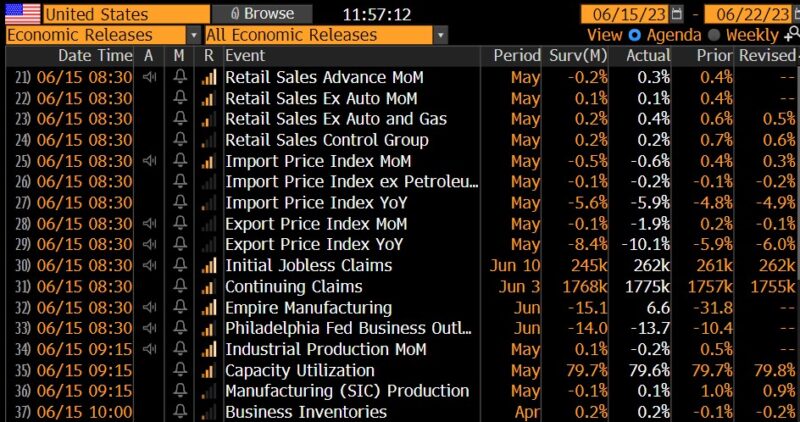Leland Abrams of Wynkoop, LLC and a portfolio manager of a fixed income fund at Catalyst, provides his analysis of the June 15 economic data – which includes retail sales, import/export prices, and initial jobless claims. Read more below:
We walked in this morning to the bond market still digesting yesterday’s very hawkish message from the FOMC. The curve continued to invert, and all bond tenors were lower in price.
8:30 am brought the market a barrage of data that was mostly bad (which is good for bonds). Retail sales were the only data that showed positivity yet declines from previous months in every category. The retail sales control group grew at 0.2% MoM down from 0.6% last month. Retail sales ex-auto and gas were up showing that relief at the pump is helping consumers spend elsewhere.
The import and export price data showed significant price declines monthly and annually, which fits the narrative of disinflation. Import price index MoM showed a drop of -0.6%, bringing YoY import prices to -5.9%, lower than expectations. Export prices declined also (-1.9% MoM and -10.1% YoY).
The most important data release we believe was the initial jobless claims (a weekly number). We wrote before that spikes in jobless claims usually portend further weakness in the job market, something the Fed is keenly focused on. The release showed initial jobless claims elevated at 262k for the week, exactly the same as the previous week, exceeding estimates of 245k. The market will continue to watch these claims numbers weekly. The strength in labor markets (which the Fed argues has the potential for upward pressure on inflation) is the last leg the Fed is holding onto before claiming victory against inflation.
Upon release, bonds rallied across the curve, erasing the losses from earlier in the morning. Remember last year when the Federal Funds rate was only at 0.25%, yet the 2-year note was at 2%? It appears the market interprets data quicker and better than the Fed. We shall see what this means for future Fed action as we progress towards July.

Source: Bloomberg. As of June 15, 2023

